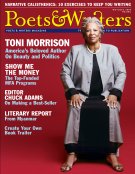After a brief but torrential thunderstorm in mid-June, eight writers of poetry and prose, myself included, huddled around a picnic table crowded with three-buck beer and leaves of printed-out poems, stories, and essays in the concrete garden of a Brooklyn bar. It had been almost a year since I'd taken a seat at a table with other writers to talk about the stuff, the meat of our writing—inspirations, obsessions, discoveries—and the project at hand every time each of us settles in to confront the blank page. All of us had spent an intense two years together at the MFA program at Sarah Lawrence College, a small liberal arts school nestled in woody Bronxville, north of New York City. Many of us had migrated to the city after graduation, and while we saw one another often enough, touching base at parties and readings, our writing lives had become privatized, with only the most dramatic aspects—I haven't been excited by a word in three months! My thesis is moldering!—shared among us. So, about thirteen months after graduating, a group of friends and I, guided by our assiduous organizer, Hossannah Asuncion, decided to create a new program in order to reestablish the connection that the MFA experience had provided. We would get together once a month to check in with one another, warm ourselves up with a few brief free-writes, and discuss a predetermined topic on which we had all read a few essays before meeting. We could also bring works-in-progress to share, though workshop-style critiquing would not be on the agenda—our gatherings would celebrate our writing as art, and our work as artists.
The very act of coming together on equal terms for a salon has reminded us that we are not isolated as writers.
Perhaps the shocking burst of rain was an apt metaphor for the two brief years we'd been ensconced in, and saturated by, a lively stream of words. The way whole days of digging in to work felt like a deluge after which the world often shone. The way words became new again in the voice of a classmate, and how the dross would be purged by the workshop process, revealing the tender bones and pulse of a piece. A creative writing program had offered to many of us an ideal experience—and then it was over. Of course, a workshop-heavy curriculum can have debilitating effects as well: Participants can tire of their work's being scrutinized in its infancy; differences in critical approaches can stifle discussion; and the compounded anxieties of the final semester can weigh on relationships, especially as solitary time to write becomes precious and staunchly defended. I'm sure the capacity for inducing this exhaustion informs our universities' having limited the MFA track to two or three years. After a while we're inundated and need to move out on our own. But writing programs don't tend to teach the skill set required to work fruitfully—and joyfully—beyond their gilt walls.
The MFA experience does not necessarily prepare us to be writers in the world. Our time as students is set apart as a sacrosanct period during which we perform the very important work of honing and polishing our craft, but little guidance is given as to how we might preserve that sacred lifestyle (as well as the more profane, yet necessary, moments of criticism and editing) once outside the bubble. On the other hand, no one could have told us then that our devotions would flag and that distractions—such as earning a living and making our way in the world—would threaten to prevent us from writing altogether.
This is not to say that constant connection to a writing community is necessary, or even entirely healthy. Once I'd successfully cast off those workshops and conferences, a momentary sense of liberation washed over me. When my thesis crossed over into the hands of my advisers, I was immediately walloped by a profound exhaustion, and there was freedom in that fatigue. I needed a break from the intensity of the MFA experience—from workshops, and even from writing. The project I had immersed myself in for two years (at times a desperate, sinking immersion) had worn me out, and I required some time to let the omnipresent criticism, however sparkling or seductively constructive, settle within me. It was like recovery after a marathon, when my legs were ripped and clunky and I needed to cross-train for a while, to teach myself how to move again. But the respite from writing and talking about writing soon devolved into a drab routine. Instead of slowly starting over, I had let myself stiffen, and the loss of my teammates—and our shared field—made the process of resuming the race profoundly difficult.
Excuses abounded. At first, no amount of time seemed long enough to sit and work, and when I'd attempt to write in short spurts, the words danced only on the surface of ideas and questions. Sometimes language simply felt inert. I often had the sense that I was playing with plastic blocks rather than textured, living things. Some pleasure had seeped out of the project of making art with words—a joy that I have discovered came from sharing both my poetry and the process of writing it. While I can't say this perception was common to all my peers, it seems that each of us has experienced an occasion—however extended—of craving community.








